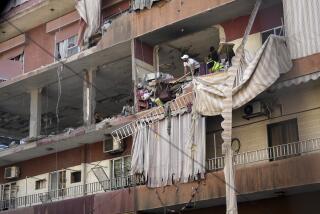Diplomacy Must Continue: Keep All Options Open : Baker-Aziz meeting apparently gets nowhere as war looms likelier
- Share via
It could have brought the world at least six hours closer to peace. But the meeting between the U.S. secretary of state and the Iraqi foreign minister looks as if it may have brought everyone at least six hours closer to war.
Baghdad should not take any pride in the silken but steely performance of Tarik Aziz in Geneva. The obvious consequence of its diplomacy is that, increasingly, it faces the full brunt and terror of an allied air, sea and land assault that could only set back Iraq’s development for years to come. Saddam Hussein is putting too much on the line for the sake of his face, pride and his political future. To hold onto Kuwait, he is risking too much of Iraq.
Washington should not feel vindicated, either, simply by having appeared to go the extra mile for peace. Baker was just as impressive as his Iraqi counterpart and no doubt won many world observers over with his repeatedly expressed interest in having U.N. Secretary General Perez de Cuellar fly to Baghdad for yet another stab at peace. But the bottom line is that Washington, like Baghdad, is further down the road than ever toward war.
Saddam Hussein perhaps hopes that Congress will fail to support the President’s policy, that the U.N. coalition will unravel, that American public support will erode and then evaporate.
From that perspective, the Bush policy has been skillful and precise. It has held the international coalition together, kept Congress informed and enjoyed substantial public support. And despite the Iraqi foreign minister’s adroit press conference, his refusal to accept the personal letter from Bush to Hussein was not only a diplomatic slap in the face, it was a public relations blunder.
At a time when the world wanted the two nations to come together, Baghdad displayed unacceptable contempt and disdain for the American President. And its grisly threat to attack Israel in the event of a war, made anew Wednesday, will not win any new friends, or influence people here, either.
What’s sad is that U.S. policy appears to be bringing us further from peace, too. Nobody but the American President knows what the United States is going to do after Jan. 15. He is taking us right down the chute to the brink of war, knowing, of course, that there are alternative courses of action.
There remains substantial sentiment for continuing to press forward with all measures short of war. Admittedly, the sanctions card is surely a slower route than war, but the question in many minds is whether it is any less wise.
Bush believes that the best way to get Saddam Hussein to retreat from his heinous aggression is to make him think that the risk is war, to bluff it right up to the edge. He may be right. And the President is right to ask Congress to get onboard, lest Saddam remain deluded. But at what point does bluff become real war? At what point on the road to war do we foreclose all other options? Are we leaving ourselves enough of a way out?
U.N. Security Council Resolution 678 authorizes the use of military force Tuesday, but does not require it. Washington has already stated that no new Security Council sessions on the Kuwait question need be scheduled for the time being. But it would be awkward for Washington to oppose the further involvement of the Security Council, whose resolutions it has relied on so heavily to justify its policy.
Granted, the new mission of the U.N. secretary general would appear to hold little promise. Perez de Cuellar has been to Baghdad once already, with nothing to show for it. But the effort needs to be made. So should the efforts of the French government be made.
Anyone with new ideas or new energies should speak up now. Iraq and the world are on the verge of a great tragedy. It was perhaps too optimistic for anyone to have hoped for much to come out of the Geneva meeting. But many people had precisely that hope. War, the final option, is never an attractive option. Diplomacy must continue.
THE MARCH TOWARD WAR
U.S. Troops in the Persian Gulf
OCTOBER: 200,000
NOVEMBER: 230,000
JANUARY: 360,000
Other Forces Include:
British: 35,000
French: 10,000
Arab: 117,000
More to Read
Sign up for Essential California
The most important California stories and recommendations in your inbox every morning.
You may occasionally receive promotional content from the Los Angeles Times.













